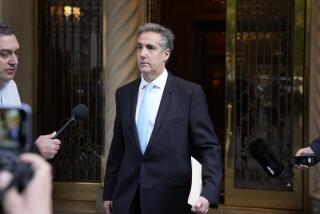Money Wasn’t Main Motive for Spying for China, Chin Testifies
- Share via
ALEXANDRIA, Va. — Confessed spy Larry Wu-tai Chin took the stand in his own defense Thursday to assert that he accepted money for passing CIA documents to Peking “only as a byproduct” of his attempt to better U.S.-Chinese relations.
“A substantial byproduct, wasn’t it?” Assistant U.S. Atty. Joseph Aronica asked the 63-year-old retired CIA employee.
“But it was much less than I earned,” Chin protested.
The Internal Revenue Service has contended that Chin may have not reported income of $1 million stemming from his 30 years of passing documents to China, although Chin himself says he received only $140,000 to $150,000 over that period. He earned $30,000 a year as a CIA analyst.
Lied on Tax Reports
Under cross-examination that ended the third day of his trial in U.S. District Court, Chin acknowledged that he had lied on his income tax reports for years when he denied having the foreign bank accounts in which he deposited money received from Chinese agents.
“That had to be done,” he said. “There was no other way out.”
After cataloguing the incidents in which Chin had purportedly lied, Aronica concluded: “For 30 years you’ve lived a life of lies, haven’t you?”
U.S. District Judge Robert R. Merhige Jr. upheld defense counsel Jacob Stein’s objection to the question and closed the session in preparation for final statements by both sidestoday.
There was no word of a plea bargain as the presentation of evidence ended, although speculation was rife earlier that Chin had pleaded not guilty, despite his earlier admission of guilt on nearly all charges, in order to negotiate a reduction in the life sentence attached to two espionage counts.
Officially Secret Documents
Stein sought Thursday to show through testimony by Howard R. Spendilow, an assistant history professor and specialist in Chinese studies at Georgetown University, that the officially secret documents passed by Chin contained information that actually was already accessible to the public.
Chin, in his own testimony, repeated his assertion that he had acted only in the interest of the United States, as well as China, throughout his employment by the U.S. government.
His first contact with a Chinese agent occurred in Hong Kong in 1951, he recalled, saying that he received his first payment of $400 for a report on Chinese prisoners of war in South Korea.
Chin, speaking in precise English, said his contacts continued when he was transferred in 1961 to the CIA’s Foreign Broadcast Information Service station in Santa Rosa, Calif., where he remained for nearly 10 years and acquired security clearance after becoming a U.S. citizen.
‘Stunned by About-Face’
After he moved to the service’s headquarters in Washington, Chin said, he learned of a secret communication from then-President Richard M. Nixon to Congress in which Nixon outlined his proposed approach to normalizing relations with Peking.
“I was stunned by the about-face of President Nixon,” Chin recounted. “I wanted Chou En-lai to see it.”
When asked by Stein why he did not consult his superiors before transmitting the document to a Chinese agent in Toronto, Chin replied: “I was afraid that, once I revealed the situation, I would immediately be fired.”
Chin said he never transmitted military information and the Chinese never asked for it.
More to Read
Sign up for Essential California
The most important California stories and recommendations in your inbox every morning.
You may occasionally receive promotional content from the Los Angeles Times.










